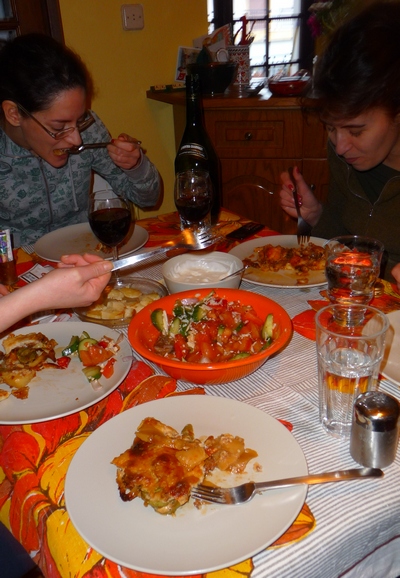 According to my tastes, Greece has the most delicious food in Eastern Europe. They energize their meals with fresh ingredients like tomatoes, eggplant, feta cheese, onions, olive oil, yogurt, zucchini, nuts, and honey. During the Byzantine and Turkish period, Greeks incorporated spices like oregano, dill, bay leaves, and mint.
According to my tastes, Greece has the most delicious food in Eastern Europe. They energize their meals with fresh ingredients like tomatoes, eggplant, feta cheese, onions, olive oil, yogurt, zucchini, nuts, and honey. During the Byzantine and Turkish period, Greeks incorporated spices like oregano, dill, bay leaves, and mint.
Today, popular dishes include souvlaki (anything marinated in olive oil, salt, pepper, oregano and then skewered), dolmathes (grapevine leaves stuffed with rice, veggies, and sometimes meat), and tzatziki (yoghurt with garlic and cucumber). Even their fast food is delicious: gyros (meat roasted on a vertically turning spit and served with sauce and garnishes on pita bread) will make you give up hamburgers. Finally, baklava (phyllo pastry layers filled with nuts and drenched in syrup or honey) is a decadent dessert to end any meal.
It’s all Greek to me
Over dinner, my four Greek hosts gave me a crash course on Greek. Niki was particularly instructive because she has a degree in the ancient Greek language. Basic phrases include yashoo (hello), adio (goodbye), puinne. . . (where is. . .), posho kani? (how much?), tikanish? (how are you?), treno (train), pote (when), tikanish? (how are you?), poli kalo (very good), katalava (understand), signomi (sorry), and, most importantly, efharishto (thank you).
About every 10 minutes Niki (whose name means Victory) loved to remind me that some English words I said were derived from Greek. She could have interrupted me more often: about 12 percent of the English vocabulary has an ancient Greek origin, including words like mathematics, astronomy, democracy, philosophy, thespian, athletics, theater, and rhetoric.
Still, this doesn’t mean Greek is easy for us. Most Greek verbs are irregular. They have four cases. They even have three ways to write their sigma character.
The first is upper case (Σ), the second is lower case (σ), and the third is used only when the word ends with the sigma character (ς). Σo σentenceς would read juσt like thiς.
There are two other annoying things besides the Greek alphabet. First, while most European countries use a word that sounds like bus or autobus, the Greeks call that vehicle a leoforio.
WTF? Second, to say yes, you have to say neh, which sounds like a negation in most European languages. So when I ask, “So the leoforio leaves today?” they’ll nod and say, “Neh!” Meanwhile, to say no, you say ohhi. As William Shakespeare said, “For my part, it was Greek to me.”
There is a misleading, unwritten rule that states if a quote giving advice comes from someone famous, very old, or Greek, then it must be good advice. — Bo Bennett

Francis Tapon is half Chilean and half French and he was born and raised in San Francisco, California. He’s been to over 80 countries, but he keeps coming back to this magical city because he loves earthquakes.
He spoke Spanish at home, French at school, and English everywhere else. He can get by in Portuguese and Italian, barely survive in Russian and Slovenian, and speak a few other languages.
Francis has an MBA from Harvard Business School and co-founded a successful Silicon Valley company that did robotic vision. He left his technology life to walk across America four times. He has thru-hiked the Appalachian Trail and the Pacific Crest Trail, and in 2007, became the first to do a round-trip on the Continental Divide Trail. In 2009, he was one of the finalists for the California Outdoors Hall of Fame, which “features nominees who are world-renowned for their skills and who have helped inspire thousands of others to take part in the great outdoors.”
Francis has written a couple of travel books including The Hidden Europe: What Eastern Europeans Can Teach Us and Hike Your Own Hike: 7 Life Lessons from Backpacking Across America. He also produced a 77-minute video about his CDT Yo-Yo.








